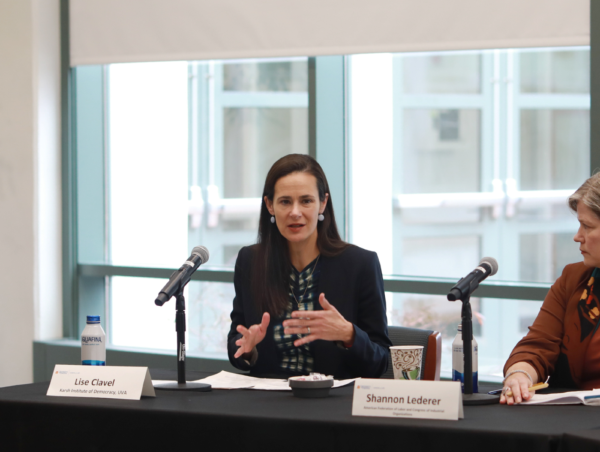
This past spring, UVA students in the class “How To Do Democracy” had a chance to learn from one of the nation’s leading experts in immigration policy – someone who until recently was advising the president of the United States – to better understand the mechanics of policy and politics, and how they could improve both.
Lise Clavel is a practitioner fellow in democracy at the University of Virginia’s Karsh Institute of Democracy, a position she took after serving as deputy assistant to the president and senior advisor for migration to President Biden and previously as chief of staff at U.S. Customs and Border Protection.
Through her one-year fellowship with Karsh, which began in September 2023, Clavel taught a democracy-focused course as part of UVA’s Catalyst Program in the College of Arts & Sciences. The idea behind Catalyst is a capstone approach that helps students translate the breadth of their undergraduate experience into real-world impact after graduation.
The program focuses on career readiness and civic engagement, and partnering with the Karsh Institute gives students access to practitioners of Clavel’s expertise, said David Flood, an assistant professor in the College and director of Catalyst.
“The partnership with Karsh is such a natural fit for our goals as a program: students get incomparable opportunities to work with expert practitioners like Lise, and we mutually get a chance to put our most important institutional ideals—the cultivation of engaged civic leaders—into experiential practice,” Flood said.
Clavel was wrestling with the idea that erosion of public trust in institutions was making it almost impossible for those institutions to fix societal problems.
Going into her course, Clavel said she was wrestling with the idea that erosion of public trust in institutions was making it almost impossible for those institutions to fix societal problems.
“And then I had to contrast that with the experience of getting to teach this group of students, who are sophisticated enough to understand what’s going on in the country today, but who also think it can be better and want to be part of making it better,” she said.
Class topics ranged from how policy proposals get top billing in a national campaign to the realities of governing and actually effecting change. Though the course offered some tips and perspective for students interested in careers in politics and policy, it was also structured for those who are going to work in other fields, but still want a better perspective on how they can help our democracy.
Isabella Flory, a fourth-year Echols Scholar studying psychology, said she found the course incredibly helpful, even though her professional aspirations aren’t in politics or public policy. After graduation, she’ll join a consulting firm as an analyst, and said the course broadened her overall perspective about good citizenship.
“The class has been really interesting in gathering a large group of people together to talk about democracy and how it works,” Flory said. “Professor Clavel started by talking about the state of government, and she’s just incredibly experienced. In some ways I realized that politics is more complex than I think.”
The course wasn’t about reinforcing partisan positions or encouraging people to be intractable, but instead focused on helping students see all perspectives and finding a way to craft policy that actually fixes problems, Flory said.
“She really emphasizes seeing the human on the opposite side of an argument, and trying to look for what is reasonable so you can build common ground.”
Elisabeth Doty, a third-year environmental studies student, agreed that the class offered a lot for students who are interested in democracy but don’t plan careers in policy.
This class has helped me to understand that I can take the personal responsibility I feel toward the collective enterprise of democracy, and I can pursue that as a personal thing, and I can pursue it also as part of my career in environmental science
“Democracy is something that we all participate in, not just limited to politics majors. My role in ‘doing’ democracy from a career perspective or as an individual is still important. I think this class has helped me to understand that I can take the personal responsibility I feel toward the collective enterprise of democracy, and I can pursue that as a personal thing, and I can pursue it also as part of my career in environmental science,” Doty said.
Doty also praised the quality of guests and speakers that Clavel introduced to the class and through other events through the Karsh fellowship.
Clavel organized panel discussions throughout the year on topics including unaccompanied children at the border, immigration and elections, and more. Those panels brought in speakers ranging from a Wall Street Journal immigration reporter to the direction of immigration policy for the AFL-CIO.